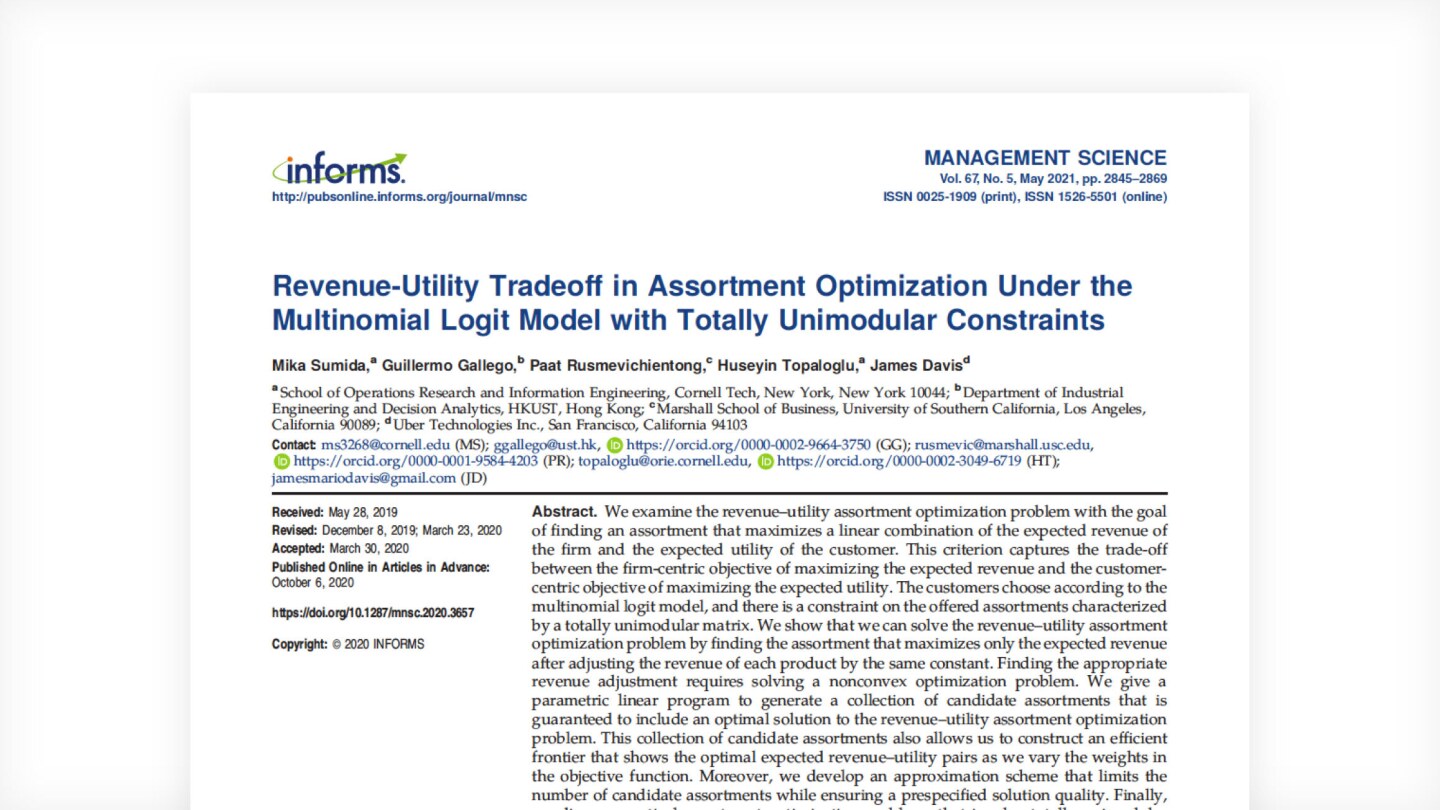Because fulfillment centers cannot stock every item in the Amazon Store, the question of how to optimally select products for same day (and sometimes sub-same day) delivery is one that scientists in Amazon’s Supply Chain Optimization technologies (SCOT) organization must routinely address. This is known as the assortment problem.

Academic research has traditionally tackled this problem by focusing on revenue. Huseyin Topaloglu, Amazon senior principal scientist and a co-author of a paper published at INFORMS in 2020, “Revenue-Utility Tradeoff in Assortment Optimization under the Multinomial Logit Model with Totally Unimodular Constraints”, explores an alternative approach. In addition to factoring in expected revenue, the paper’s authors also take into account the expected utility to the end customer.
Topaloglu, who joined Amazon in July 2020, is on leave of absence from Cornell University where he has spent 18 years as a professor at the School of Operations Research and Information Engineering. His portfolio of research focuses on revenue management, supply chain management, fleet management, and pricing. Topaloglu, who earned a bachelor’s in industrial engineering from Bogazici University in Turkey, and master’s and PhD degrees in operations research and financial engineering from Princeton, says he is drawn to the tangible nature of problems in operations research.
“The problems play out at a physical, real-world level, and this physicality is also apparent in the solutions,” he says.
For Topaloglu, that real-world focus also extends to determine the ideal assortment of products Amazon should carry within its fulfillment centers. Finding the optimal product selection is vital to enabling the company to fulfill delivery promises.
As part of an ongoing series on scientists within SCOT, Amazon Science spoke to Topaloglu about the assortment problem in revenue management, using a customer-focused approach to arrive at an ideal solution, and how Amazon can obtain optimal product assortments at scale.
Q. What is the assortment problem in revenue management?
Broadly speaking, the assortment problem in revenue management explores methods to offer the optimal assortment — or selection — to customers from a universe of products. Customers can interact with the assortment either by engaging with the selection and making a purchase or by leaving the system without making a purchase.
The goal in academic assortment optimization problems is to maximize the expected contributions from every customer, and to maximize overall revenue. At their heart, assortment problems are inherently combinatorial in nature: you have to find the maximizer of an objective function from a large universe of possible assortments.
Assortment optimizations are important for a variety of reasons that extend beyond revenue maximization.
Modeling the choice process of customers is an important aspect of assortment optimization. We can accomplish this by measuring the utilities customers assign to different products. For example, one approach is to estimate the utility of every product as a function of its features. In a stylized model of choice, customers might evaluate a computer based on processing power, RAM, hard drive capacity, etc. They place a weight on each of these features. We can put the features and associated weights together, as we would do in a regression problem, and arrive at a concrete measure of utility to the end customer.
As scientists, we have to design probability distributions that accurately model customer choice. To do this, we could develop a probability model that captures the intricacies of choice behavior such as correlations between products — for example, we could assign higher correlation between the utility of a ballpoint pen and a fountain pen than between that of a ballpoint pen and a pencil.
Assortment optimizations are important for a variety of reasons that extend beyond revenue maximization. They can provide a barometer of customer satisfaction, which is important because you want people to keep coming back because they can find what they need.
Assortment optimization also informs inventory placement. At Amazon, we might decide not to ship palettes with a new brand of toothpaste to a fulfillment center that has limited space, because customers shopping for toothpaste are often not amenable to switching brands. However, we might decide to stock both pens and notebooks, because a customer that can’t find a notebook might likely abandon their shopping cart which already contains a pen.
Q. How can you obtain the optimal assortment?
In our paper, we formulate the optimization problem in a way that maximizes the expected revenue of the company, but also considers the expected utility to the customer from the purchase.
Our approach maximizes a linear combination of the expected revenue of the firm, and a constant that’s multiplied by the expected utility of the customer. The constant provides a lever. By increasing or decreasing its value, we can arrive at a range of assortments.
We can determine the company revenue for different values of the constant. To measure customer utility, we can look at the revenue miss that results from how often customers leave the store without making a purchase. Now that we have put a dollar value on both the revenue and customer satisfaction, we can work our way to the optimal assortment.
The beauty of this approach is in its simplicity: since we are already using utility-based choice models to arrive at our probability distributions, there’s almost no extra work needed to factor customer utility into our model.
Q. How can Amazon achieve optimal assortment at scale?
In operations research, writing models can be easy. However, as scientists, we also must solve these problems efficiently. The approach described in our paper accomplishes this in several ways.
In operations research, writing models can be easy. However, as scientists, we also must solve these problems efficiently.
The first relates to a discretization approach. When you have a catalog as large as Amazon’s, it is inefficient— in fact, nearly impossible — to calculate every feasible assortment. That’s why we take this combinatorial optimization problem and convert it into a continuous optimization problem. To get around the large number of assortments, we utilize a discretization approach to derive the ideal assortment from a smaller universe of candidate assortments.
The second way we solve the assortment optimization problem efficiently is by imposing unimodular constraints. When we choose an assortment from a larger universe, we can’t offer everything to the customer. As a result, we impose constraints on the model.
These may relate to precedence. For example, you can’t offer notebooks without also offering pens. Or we can impose other constraints. These relate to how customers assign utilities to products based on their features: there’s an inherent ordering in the qualities of the products, and the other constraints must adhere to the same ordering.
We use unimodular constraints to arrive at the optimal solution. In a continuous optimization problem, the feasible set of assortments is large and might not give you a 0 or 1 decision. Such decisions can, however, always be achieved at the corners of the feasible space. By focusing on the corners and imposing unimodular — 0 or 1— constraints, we are able to place bounds on the number of offered products, and are able to efficiently frame the problem as a continuous optimization problem.
Innovations like these can also allow companies like Amazon to achieve optimal assortments at scale to maximize long-term customer value.
Finally, there’s the model itself. We use a multinomial logit model, which is compatible with the random utility maximization principle. As I stated earlier, this principle ties in to how customers assign random utilities to various alternatives before choosing the alternative with the largest utility. Utilizing the multinomial logit model to express probability distributions makes it simple to express choice probabilities, and arrive at the ideal assortment.
Innovations like these can also allow companies like Amazon to achieve optimal assortments at scale to maximize long-term customer value. It’s important to note that the findings in the paper are only a beginning. Incorporating customer-centric performance measures into assortment opens numerous possibilities for future research, and I’m excited to be at Amazon where a lot of this work is taking place.


















